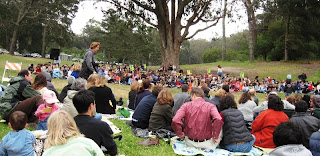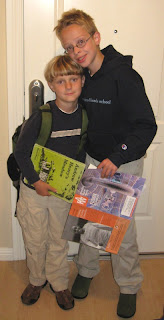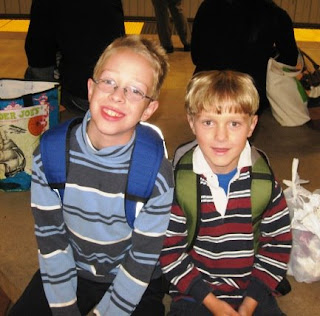I liked the book because he presented many examples of communities that are doing real things to make changes in the way they live, farm, eat, or build community, so that they can help sustain the earth and the ecosphere. He also had some great data about trends, such as the explosive growth in farmers' markets over the last 20 years, and the productivity of small, intensively farmed agricultural land compared to huge tracts of industrially farmed land. And in places his analysis seems so obvious, I wondered why I hadn't thought of it before; such as the decline in number of U.S. farmers is because they have been replaced with machines running on (heretofore) cheap oil.
Here are some passages I found interesting:
Page 2: Shifting our focus to local economies will not mean abandoning Adam Smith or doing away with markets. Markets, obviously, work. Building a local economy will mean, however, ceasing to worship markets as infallible and consciously setting limits on their scope. We will need to downplay efficiency and pay attention to other goals. We will have to make the biggest changes to our daily habits in generations—and the biggest change, as well, to our worldview, our sense of what constitutes progress.Concluding his introduction, McKibben mentions a trip to China, where he met a 12-year-old girl named Zhao Lin Tao, who lives in a poor rural village: “about the most statistically average person on earth.” She was proud of her English; yet her mother left the family to work in a factory, and Zhao has a hard life. "In Zhao’s world, in other words, it’s perfectly plausible that More and Better still share a nest. Any solution we consider has to contain some answer for her tears. Her story hovers over this whole enterprise. She’s a potent reality check."
… The key questions will change from whether the economy produces an ever larger pile of stuff to whether it builds or undermines community—for community, it turns out, is the key to physical survival in our environmental predicament and also to human satisfaction. Our exaltation of the individual, which was the key to More [as in, the pursuit of More More More], has passed the point of diminishing returns. It now masks a deeper economy that we should no longer ignore.
[Like “deep ecology,”] we need a similar shift in our thinking about economics—we need it to take human satisfaction and society durability more seriously; we need economics to mature as a discipline.
McKibben highlights three challenges to growth:
- Politically, growth is distributed unequally.
- We don't have the energy needed to keep growth going as it has done.
- The third argument is both less obvious and even more basic: growth is no longer making us happy. [his emphasis]
Striking language on page 17:
If fossil fuel is a slave at our beck and call, renewable power is more like a partner…. It seems likely that fossil fuel was an exception to the rule, a onetime gift that underwrote a onetime binge of growth. In any event, we seem to be on track to find out.As mentioned he says that small farms are more productive, and large farms are built on cheap energy:
Page 64: Because of its reliance on cheap energy, the efficiency of our vast farms and the food system they underwrite is in one sense an illusion, and perhaps a very temporary one. The number of American farmers has fallen from half the American population to about 1 percent, and in essence those missing farmers have been replaced with oil. We might see fossil fuel as playing the same role that slaves played in early American agriculture—a “natural resource” that comes cheap…. There aren’t many people on that farm, but there’s all kinds of machinery, and every bit of it is burning fuel. Here’s the math: between 1910 and 1983, U.S. corn yields grew 346 percent. Energy consumption for agriculture increased 810 percent. [my emphasis]The section on page 108 on the "declining marginal returns" of both income and companionship are really worth reading, so I won't quote it here. He continues:
Every measure of psychological health points to the same conclusion: people who “are married, who have good friends, and who are close to their families are happier than those who are not,” says the Swarthmore psychologist Barry Schwartz. “People who participate in religious communities are happier than those who are not.” Which is striking, Schwartz adds, because social ties “actually decrease freedom of choice.” To be a good friend is hard work.So, f/Friends, take heart!
PS A final Quaker note: There's a nice quote from Quaker economist Kenneth Boulding on page 24.


